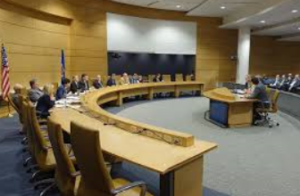Bonding Bill Fine Print Undercuts Met Council Powers
Conservatives often complain about surprises uncovered in the fine print of legislation that gets slipped into bills late in the process. “We have to pass the bill so that you can find out what’s in it,” former Speaker of the House Nancy Pelosi infamously blurted about Obamacare.
Now the shoe’s on the other foot with the 2018 bonding bill recently passed by the Minnesota Legislature and currently awaiting Gov. Mark Dayton’s signature–or not.
It doesn’t involve anything as breath-taking as commandeering one-sixth of the nation’s economy through health care, but rather clamping down on big government in the form of the Met Council.
The regional government’s lobbying staff was surprised by the last-minute additions, which stem partly from a conflict over land use in northern Anoka County. They are among the few policy provisions in the bonding bill, which is now in the hands of Gov. Mark Dayton, a DFLer who appoints the Met Council members.
One change would allow cities to have an administrative law judge or the council’s land use panel consider the “need for or reasonableness” of the council’s plans, or parts of them, for the seven-county metro area. Another change gives the rural city of Nowthen unprecedented authority over the council’s plans for its future.
“That is really creating a new approach to comprehensive planning,” Met Council lobbyist Judd Schetnan told the council Wednesday, referring to the Nowthen change. “I don’t know if you can even call it that at this point, if the council has to just basically approve what’s going on there.”

Liberals were already up in arms over the $850 million wish list of pet capital projects pared down from Dayton’s bloated $1.5 billion proposal by the the Republican-led legislature. But the provisions aimed at empowering cities chafing under the nation’s most powerful unelected regional government also threaten to loosen the left’s hold on power.
Both Oak Grove and Nowthen are in House Speaker Kurt Daudt’s district. Daudt, R-Crown, said Nowthen had requested a change similar to what Oak Grove secured in 2017. He said the broader planning change corrected language that was inserted into last year’s transportation bill.
“It basically just allows [cities] to have some level of recourse if they don’t like what the Met Council is doing,” Daudt said.
Oak Grove Mayor Mark Korin, who pushed for the change, said people should be able to present competing arguments to a judge for review.
“The language that’s in law right now says, ‘No, once the Met Council makes a decision, it’s final. Too bad, so sad. We’re the powerful ones,’ ” Korin said. “And that’s not right. That’s just absolutely wrong.”
It’s not clear whether Dayton intends to sign the bonding bill containing the fine print curbing the Met Council’s largely unchecked authority.
The bonding bill’s language about Nowthen, a city of 4,500 people, says the Met Council must change regional plans for Nowthen to “implement any changes requested by the city” relating to its land designation, which guides what density it should have. The council says there is no precedent giving a city such broad discretion.
“The [change] would provide that community a blank check irrespective of the costs or impacts to other metropolitan communities or to the region as a whole,” Barajas said.
Dayton has already vetoed legislation reforming the Met Council into a body represented by locally elected public officials, rather than gubernatorial appointees. But a veto of a bonding bill containing construction projects in every corner of the state carries far greater political risk, particularly in an election year.